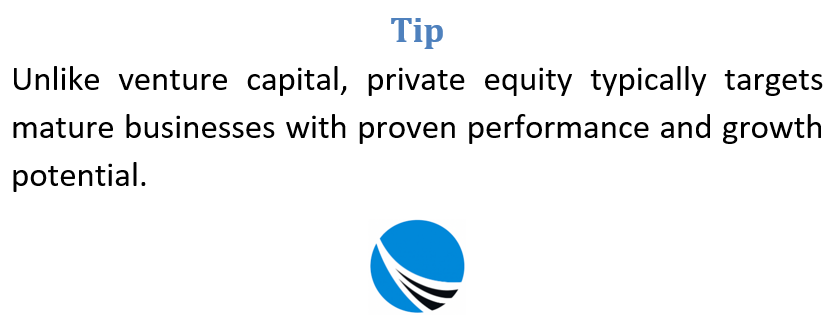Private equity plays a pivotal role in helping established businesses accelerate their growth, restructure, or transition ownership. Unlike public market funding, this form of finance involves private investors injecting substantial capital into companies in return for partial or majority ownership. This article walks you through how private equity works, how it compares with other funding mechanisms, and the factors you must consider when navigating a potential deal.

What Does Private Equity Involve?
Private equity refers to investments made directly into private companies, often with the goal of enhancing value over several years before selling the stake for a return. These investments typically target businesses that are beyond the startup phase but still require a capital boost and operational expertise to expand or improve.
In many cases, private equity is used to support management buyouts, business succession, or strategic transformations. The capital provided is accompanied by hands-on guidance from the investors, who usually secure a seat at the board table to influence major decisions.
A Real-Life Example in Practice
Imagine a mid-sized manufacturing company that has operated successfully for over a decade. It has steady customers, reliable revenues, and a strong reputation, but growth has stalled. The founders want to expand into new regions and modernize operations, yet bank loans are restrictive and issuing shares publicly feels premature. A private equity firm steps in, acquiring a significant stake and injecting capital to upgrade equipment, improve financial controls, and strengthen leadership. Over several years, revenues grow, margins improve, and the business becomes more competitive. Eventually, the investors exit through a sale or secondary buyout, leaving behind a larger, more resilient company—and rewarding both parties for the partnership.
Exploring the Concept of a Buyout
A buyout occurs when an investor or group acquires a controlling interest in a company. When current management leads the acquisition, it’s known as a management buyout. Alternatively, if the funding heavily relies on borrowed money, the transaction is classified as a leveraged buyout.
Buyouts are common during company ownership transitions, including when a business shifts from public to private hands. They allow for more strategic agility under private ownership and typically include a robust performance improvement agenda.

Private Equity Versus Going Public
Choosing between private equity and launching an Initial Public Offering (IPO) depends largely on a company’s goals and structure. While IPOs bring public scrutiny, regulatory obligations, and widespread ownership, private equity offers a focused, partnership-based approach. Investors and management teams work closely to drive improvements without the constant pressure of quarterly earnings or stock market volatility.
Private equity also provides a level of flexibility not afforded in public markets, enabling long-term changes in operations, workforce, and market strategies that can be difficult under shareholder expectations in listed firms.
How It Differs From Venture Capital
Venture capital and private equity are both forms of equity financing, but they differ significantly in purpose and timing. Venture capital focuses on early-stage ventures—startups or businesses in their infancy with high growth potential but limited track records.
In contrast, private equity firms target companies with a history of operations and revenue generation. These businesses are typically looking to optimize performance, streamline operations, or scale up, and they benefit from the resources and strategic insight of experienced investors.
Who’s Involved in a Private Equity Deal?
Several key parties come together in a typical private equity transaction:
- Business owners: The current proprietors seeking capital, partial exit, or full divestment.
- Private equity firms: Investors providing funding in exchange for ownership and influence.
- Financial advisers: Professionals who support both buyers and sellers during valuation, due diligence, and negotiations.
- Legal teams: Lawyers on each side ensure the terms and obligations of the deal are clearly documented and compliant with applicable laws.
- Debt providers: In leveraged buyouts, banks or alternative lenders finance part of the acquisition.
Each party plays a vital role in shaping the outcome of the deal and the future trajectory of the business.
What Investors Want in a Target Business
Private equity investors are selective. They seek companies with solid fundamentals, stable revenue, and strong leadership teams. A clear path for growth or transformation is essential, whether it’s expanding into new markets, enhancing margins, or improving operational efficiency.
Additionally, they prefer businesses that are agile enough to implement change but structured enough to scale effectively. Strategic vision, sound financial health, and openness to partnership are strong indicators of a company ready for investment.
Key Advantages of Private Equity
Engaging with private equity can yield substantial benefits:
- Significant funding: Businesses can gain access to substantial amounts of capital—often millions—that would be difficult to secure through traditional lending.
- Expert guidance: Investors bring strategic direction and often have experience in scaling similar businesses, making them valuable mentors.
- Increased valuation: Their involvement tends to raise a company’s overall value through performance improvements and better market positioning.
- Network access: Private equity firms often open doors to new partners, talent, and resources that can fuel expansion and innovation.
- Exit planning: From the outset, these investors plan an eventual sale or exit, which helps focus efforts on long-term value creation.
Potential Drawbacks of Private Equity
Despite its benefits, private equity comes with certain risks:
- Reduced autonomy: Founders and executives often relinquish control or influence, especially when investors hold a majority stake.
- Exit pressure: Investors typically aim to exit within a defined period—usually five to seven years—potentially impacting longer-term strategies.
- Uncertain outcomes: There’s no guarantee that investment will lead to the intended growth, especially in highly competitive markets.
- Cultural change: Operational restructuring and shifts in company culture may arise, which can be challenging for long-standing teams.
Companies must weigh these risks against the potential rewards when considering this type of investment.
Picking the Right Deal
Finding the right private equity partner is as important as securing the funding itself. Here are some guiding principles:
- Seek more than cash: Look for firms that offer deep industry knowledge, not just capital. Their strategic input can be just as valuable.
- Understand expectations: Clarify the investor’s goals, exit timelines, and governance requirements to ensure alignment.
- Choose a compatible team: A close working relationship is vital, so ensure the investor’s values, communication style, and approach match your own.
- Be prepared to negotiate: From equity splits to decision-making authority, expect robust discussions. Having experienced advisers on your side is crucial.
Factors to Weigh Before Accepting an Offer
Before engaging with private equity investors, consider the following:
- Loss of control: Investors may request majority ownership or decision-making authority, impacting your autonomy.
- Board influence: They’ll likely expect a say in governance, including appointing new board members or advisors.
- Time-bound commitment: Most investors aim to exit within five to seven years, which may limit long-term planning.
- Transformational impact: Expect significant changes in leadership structure, reporting, and business strategy. You must be ready to adapt.
These considerations should be reviewed carefully, ideally with support from legal and financial professionals.
Drawing Interest from Private Equity Firms
To attract private equity, businesses should position themselves as scalable, stable, and ready for growth. This involves:
- Professional presentation: Have your financial records, business plans, and market analysis ready and well-organized.
- Clear strategy: Investors want to see a compelling narrative around your business model and future opportunities.
- Referrals and networking: Use your contacts—such as accountants, bankers, or industry peers—to get introduced to reputable firms.
- Proactive outreach: Don’t wait to be discovered. Reach out to firms that specialize in your industry or growth stage.
It’s a competitive space, so businesses need to demonstrate readiness and strategic potential.
Conclusion: Is Private Equity Right for You?
Private equity can be a powerful engine for growth, innovation, and transformation—especially for businesses at a crossroads or entering new markets. However, it also comes with expectations, oversight, and a limited timeline. Understanding what you’re getting into, evaluating potential partners carefully, and preparing for significant changes are all critical to making the most of a private equity relationship.
Ultimately, it’s about aligning your business vision with investors who can help bring it to life—financially, strategically, and operationally.

Frequently Asked Questions about Private Equity
What Is Private Equity?
Private equity involves investing directly into private companies, typically in exchange for ownership and strategic influence to drive growth.
How Does a Buyout Work?
A buyout is when investors acquire a controlling stake in a business, often through management-led purchases or leveraged financing.
How Is Private Equity Different From an IPO?
Unlike IPOs, private equity involves private investment with closer operational involvement and no public market pressures.
How Does Private Equity Compare to Venture Capital?
Venture capital targets early-stage startups, while private equity focuses on established businesses needing capital for growth or restructuring.
Who Participates in a Private Equity Deal?
Key players include business owners, investors, legal and financial advisors, and sometimes lenders in leveraged buyouts.
What Do Private Equity Investors Look For?
They seek businesses with strong leadership, scalable operations, and clear growth strategies that offer long-term value creation.
What Are the Advantages of Private Equity?
Benefits include large capital injections, strategic guidance, enhanced networks, and planned exits that increase company value.
What Risks Come With Private Equity?
Risks include reduced control, cultural change, exit pressure, and the possibility that growth targets may not be met.
How Can a Business Attract Private Equity?
Companies should present strong financials, a clear vision, and be open to transformation, using advisors and proactive outreach to connect.

